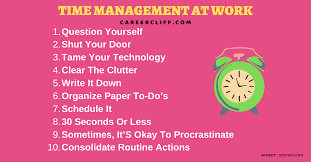Table of Contents
Introduction
In today’s fast-paced world, managing time effectively is crucial for personal and professional success. As professionals, we often find ourselves overwhelmed with numerous tasks, deadlines, and responsibilities. However, by implementing proven time management strategies, we can optimize our productivity, reduce stress, and achieve our goals efficiently. In this article, we will explore practical tips and techniques to help you manage your time effectively and excel in your work. www.impeccablewebtech.com
Understanding the Value of Time
Time is a precious resource that should be treated with utmost respect and value. To manage time effectively, we need to recognize its importance and make a conscious effort to utilize it wisely. Each day consists of a finite number of hours, and how we allocate and utilize those hours determines our productivity and success.
Setting Clear Goals and Priorities
The first step in effective time management is setting clear goals and priorities. Start by defining your short-term and long-term objectives. Break down larger goals into smaller, manageable tasks. This allows you to focus on specific objectives and allocate time accordingly. Prioritize tasks based on urgency and importance, ensuring that critical tasks are given the attention they deserve.
Planning and Scheduling
A well-thought-out plan is essential for effective time management. Create a daily, weekly, or monthly schedule to organize your tasks and activities. Utilize tools such as calendars, planners, or digital applications to track your schedule and set reminders. Allocate specific time slots for different activities, including work tasks, meetings, breaks, and personal commitments. By having a structured plan in place, you can stay organized and make the most of your time.
Avoiding Procrastination
Procrastination is a common time management challenge that can hinder productivity. It’s crucial to overcome this habit and develop a proactive mindset. Break tasks into smaller, manageable steps and tackle them one by one. Set deadlines for each task to create a sense of urgency. Minimize distractions and create a conducive work environment that promotes focus and concentration. By combating procrastination, you can make significant progress in your work and reduce unnecessary stress.
Delegating and Outsourcing
Recognize that you can’t do everything on your own. Delegating tasks to others and outsourcing certain responsibilities can save you time and energy. Identify tasks that can be assigned to colleagues, subordinates, or external professionals. Clearly communicate your expectations and provide necessary instructions. Delegation allows you to focus on high-priority tasks and optimize your productivity.
Effective Communication
Clear and concise communication is vital for efficient time management. When working collaboratively, ensure that instructions and expectations are communicated effectively. Misunderstandings and confusion can lead to time wastage and delays. Practice active listening and ask clarifying questions when needed. By promoting effective communication, you can minimize errors, streamline processes, and save valuable time.
Minimizing Multitasking
Contrary to popular belief, multitasking does not always lead to increased productivity. In fact, it can often result in decreased efficiency and decreased quality of work. Instead of attempting to juggle multiple tasks simultaneously, focus on one task at a time. Give it your full attention and complete it before moving on to the next. This approach enhances concentration, improves accuracy, and ensures that tasks are completed more efficiently. How to Manage Time for Work
Taking Regular Breaks
While it may seem counterintuitive, taking regular breaks is essential for maintaining productivity and managing time effectively. Continuous work without breaks can lead to burnout and diminished focus. Incorporate short breaks into your schedule to relax, rejuvenate, and recharge. Use this time to engage in activities that refresh your mind, such as going for a walk, meditating, or practicing deep breathing exercises. By allowing yourself moments of rest, you can sustain productivity and prevent mental fatigue.
Continual Learning and Improvement
Time management is an ongoing process that requires continual learning and improvement. Stay updated with the latest productivity techniques, tools, and strategies. Attend workshops, read books, or participate in online courses that focus on time management skills. Regularly assess your progress and make adjustments to your approach as needed. By committing to lifelong learning, you can refine your time management abilities and stay ahead in your work. How to Manage Time for Work
Conclusion
Efficient time management is a critical skill for success in the modern professional world. By setting clear goals, planning effectively, avoiding procrastination, delegating tasks, and implementing other valuable strategies, you can optimize your productivity and achieve your objectives. Remember, managing time is not about adding more hours to the day but making the most of the time you have. By following the tips outlined in this article, you can take control of your time, excel in your work, and leave your competitors behind.
Start your journey towards effective time management today, and experience the transformative impact it can have on your personal and professional life.
